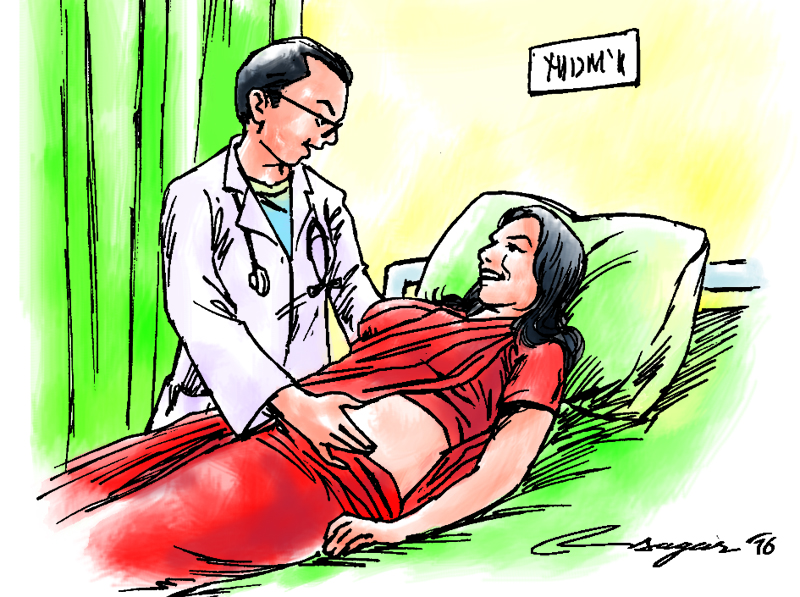Public health:Dealing with threats
During the 20th century and early in the next, the dramatic increase in average life span is widely credited to public health achievements, such as vaccination programs and control of many infectious diseases
Public health is the science and art of preventing disease, prolonging life and promoting health through organised efforts and informed choices of society, organisations, public and private, communities and individuals.
It is concerned with threats to health based on population health analysis. The dimensions of health can encompass a state of complete physical, mental and social well-being and not merely the absence of disease or infirmity.
Public health incorporates the interdisciplinary approaches of epidemiology, bio-statistics and health services.
Environmental health, community health, behavioural health, health economics, public policy, insurance medicine and occupational health are other important sub-fields.
The focus of public health intervention is to improve health and quality of life through the prevention and treatment of disease and other physical and mental health conditions, through surveillance of cases and the promotion of healthy behaviours.
Promotion of hand washing and breastfeeding, delivery of vaccinations, and distribution of condoms to control the spread of sexually transmitted diseases are examples of common public health measures.
The focus of a public health intervention is to prevent and manage diseases, injuries and other health conditions through surveillance of cases and the promotion of healthy behaviours, communities and environments.
Many diseases are preventable through simple, non-medical methods. Simple act of hand washing with soap can prevent many contagious diseases.
In other cases, treating a disease or controlling a pathogen can be vital to preventing its spread to others, such as during an outbreak of infectious disease, or contamination of food or water supplies.
Public health communications programs, vaccination programs, and distribution of condoms are examples of common public health measures. Public health plays an important role in disease prevention efforts in both the developing world and in developed countries.
Public health, emergency preparedness and response, and infectious and chronic disease control and prevention. Public health system in India is managed by the Ministry of Health and Family Welfare of the government of India with state owned health care facilities.
There is a vast discrepancy in access to health care and public health initiatives between developed nations and developing nations.
In the developing world, public health infrastructures are still forming. There may not be enough trained health workers or monetary resources to provide even a basic level of medical care and disease prevention.
As a result, a large majority of disease and mortality in the developing world results from and contributes to extreme poverty. Expenditures on health care should not be confused with spending on public health.
Public health measures may not generally be considered health care in the strictest sense.
Public health is a modern concept of human development in science, although it has roots in antiquity. From the beginnings of human civilisation, it was recognised that polluted water and lack of proper waste disposal spread communicable diseases.
The establishment of governments placed responsibility on leaders to develop public health policies and programs in order to gain some understanding of the causes of disease and thus ensure social stability prosperity and maintain order.
The term healthy city used by today’s public health advocates reflects this ongoing challenge to collective physical well being that results from crowded conditions and urbanisation.
It was well understood that proper diversion of human waste was a necessary tenet of public health in urban areas. Burning parts of cities resulted in much greater benefit, since it destroyed the rodent infestations.
The development of quarantine in the medieval period helped mitigate the effects of other infectious diseases. The plague model of governmentality was later controverted by the cholera model.
A cholera pandemic devastated Europe between 1829 and 1851, and was first fought by the use of what Foucault called social medicine, which focused on flux, circulation of air, location of cemeteries.
All those concerns, born of the miasma theory of disease, were mixed with urbanistic concerns for the management of populations, which Foucault designated as the concept of bio-power.
Miasma theory correctly teaches that disease is a result of poor sanitation, it was based upon the prevailing theory of spontaneous generation.
Modern era of public health did not begin until the 1880’s, with Louis Pasteur’s germ theory and production of artificial vaccines.
Other public health interventions include latrinisation, the building of sewers, the regular collection of garbage followed by incineration or disposal in a landfill, providing clean water and draining standing water to prevent the breeding of mosquitoes.
Previous efforts in many developed countries had already led to dramatic reductions in the infant mortality rate using preventative methods.
During the 20th century and early in the next, the dramatic increase in average life span is widely credited to public health achievements, such as vaccination programs and control of many infectious diseases.
Rajja is a medical doctor serving with Cairo University Hospitals Giza






